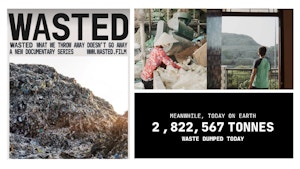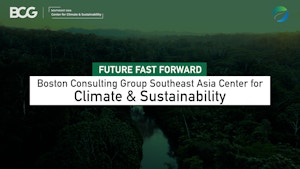Singapura Berita

Karbon & Iklim
Singapore government cautions against firms and countries jumping ‘too quickly’ into carbon markets
Bilateral agreements become “flimsy” when countries lack clarity on meeting their own climate goals while selling carbon offsets, says a city-state official. The republic has struggled to buy eligible credits from its two partners nations.

Industry and activists say governments must invest in battery recycling infrastructure before surge in electric vehicles.

As declining oil output increases reliance on on foreign supply, the region’s oil import bill could exceed US$200 billion by 2050, posing major economic and energy security risks without a faster renewables shift, says the global energy authority.

Karbon & Iklim
Marine conservationist ‘trepidatious’ over role of blue carbon credits in protecting ocean
Prominent aquanaut Fabien Cousteau urges caution in putting a price on marine ecosystems, arguing that too many actors in the blue carbon economy are focused on short-term gain and are out of sync with the way nature works. He called for blue carbon standards and slammed plans to mine the ocean floor as "reckless" without more research.
Singapura Opini

The number of cancer cases in Singapore is on the rise even though the hazardous material was banned more than 30 years ago.

How the region’s populations view decarbonisation as the energy transition occurs can inform stronger leadership and better policymaking at the elite level.

It is risky to assume the many high-level standard-setting initiatives today can provide blanket improvements. Asian businesses all have a part to play to create a trusted carbon market that benefits climate, nature and stakeholders.

Pangan & Agrikultur
La Niña: boon or bane for Southeast Asia’s food security?
The expected advent of the La Niña might portend a double-edged sword for affected regions.
Kebijakan & Keuangan
Singapore's banks and regulators can do more to drive a regional coal phaseout
Transportasi
The wrong road to lower transport emissions
Transportasi
EVs alone won't save us from climate catastrophe
Singapura Video

Studio EB
Amid fresh debates about what corporate purpose should be, there is mounting evidence that corporate purpose leads to stronger brand reputation, better talent attraction and more resilience, leading to improved financial performance.

Launched as policymakers lock horns with petrochemicals lobbyists over a treaty to end plastic pollution, the documentary produced by Eco-Business asks why opportunities to solve humanity's waste crisis are being wasted. It will premiere in Singapore and screen on the sidelines of the upcoming COP28 climate summit.

Kebijakan & Keuangan
Tackling climate change in a mosaicked Asia
Studio EB
Asia's green transition pathways need to be socially inclusive given huge differences in economic development across the region, says experts at the Boston Consulting Group. State-owned enterprises have an "outsized" role to play, they add.

The Green Mortician is the city-state's first water cremation service, which has a small carbon footprint compared to traditional funeral options.
Singapura Podcasts

Karbon & Iklim
‘Five years ago, everyone wanted to be Elon Musk’: Where is climate tech in Southeast Asia now?
Entrepreneur Steve Melhuish tells the EB Podcast where the biggest opportunities to reduce emissions and make money are in Southeast Asia, and why finding the right economic incentives is critical for climate tech startups.

Kebijakan & Keuangan
‘DIY until we die’? LGBTQ rights group on what Singapore’s new leadership means for its movement
LGBTQ people have long had to chart their own paths in the face of discrimination on bread and butter issues, like housing and employment. Pink Dot campaigners tell the Eco-Business Podcast their hopes amid a political leadership refresh.

Karbon & Iklim
‘A 1.1°C warmer world is already a matter of life and death’: Climate scientist Winston Chow
The Singapore scientist, recently elected to the UN's top climate body, tells the Eco-Business Podcast about the precarious state of climate adaptation in developing Asia. The region is not well-prepared to manage the cascading risks of extreme climate events, he says.

Pangan & Agrikultur
Looking past the label: the nutritionists’ guide to plant-based milk
Studio EB
Plant-based milks have grown in popularity in recent years, driven by a combination of health, environmental and practical concerns. Nutritionists on the Eco-Business podcast, produced in association with Kerry, weigh the pros and cons of non-dairy milk.
Singapura Rilis Pers

UN Trade and Development (UNCTAD)
Southeast Asia: Foreign investments resilient despite global economic uncertainties

UN Global Compact Network Singapore
UN Global Compact Network Singapore announces revamped Carbon Emissions Recording Tool

Brookfield Asset Management
Brookfield raises US$2.4 billion for Catalytic Transition Fund supported by anchor commitment from Altérra
Singapura Riset

Eco-Business for Temasek's Ecosperity
Ecosperity Week 2024 post-conference report: Renewing our Vibrant Spring

Eco-Business, supported by UiPath
Navigating ESG reporting challenges through innovation and collaboration

Normative
How to reduce supplier carbon emissions

Eco-Business & Regional Project Energy Security and Climate Change Asia-Pacific of the KAS
The value of biodiversity for Asia's megacities








